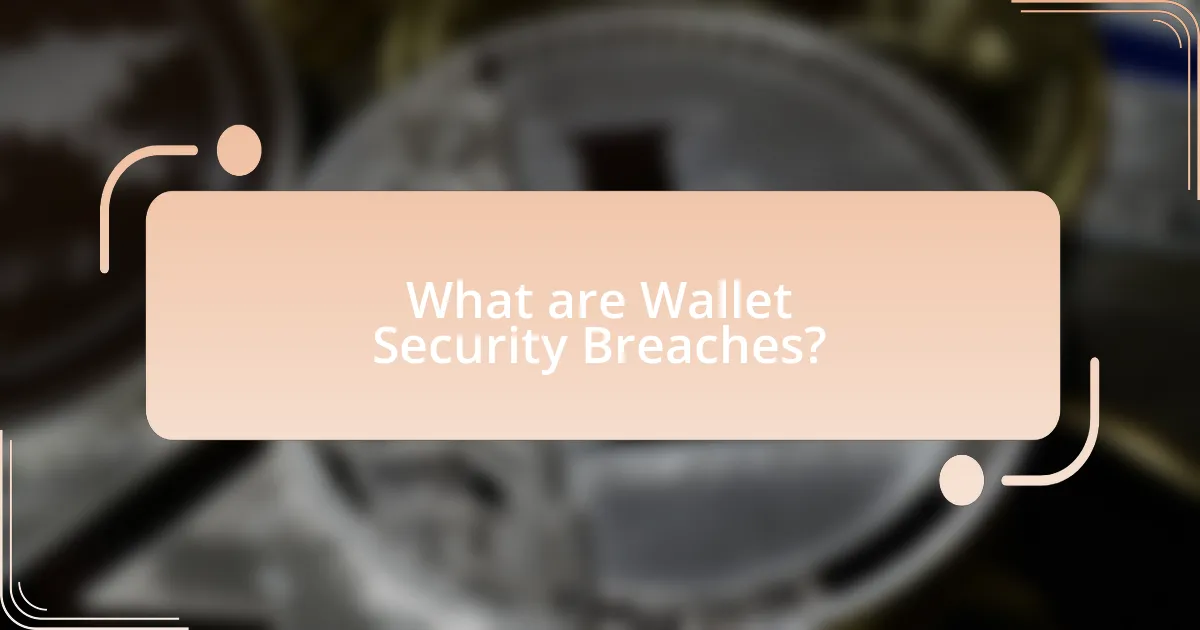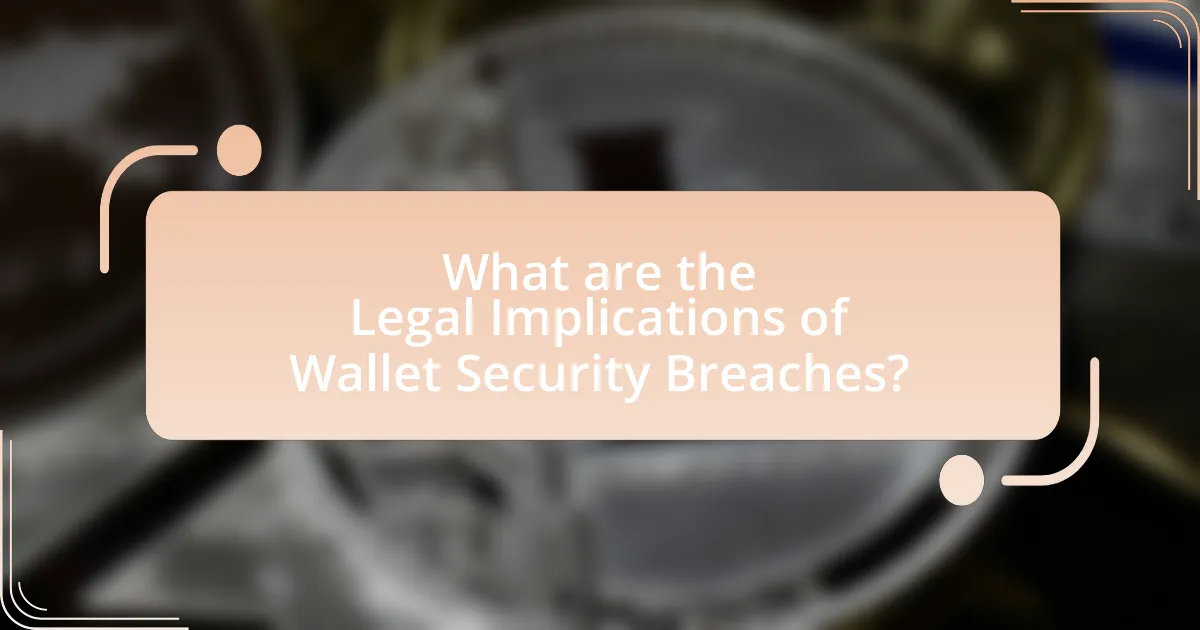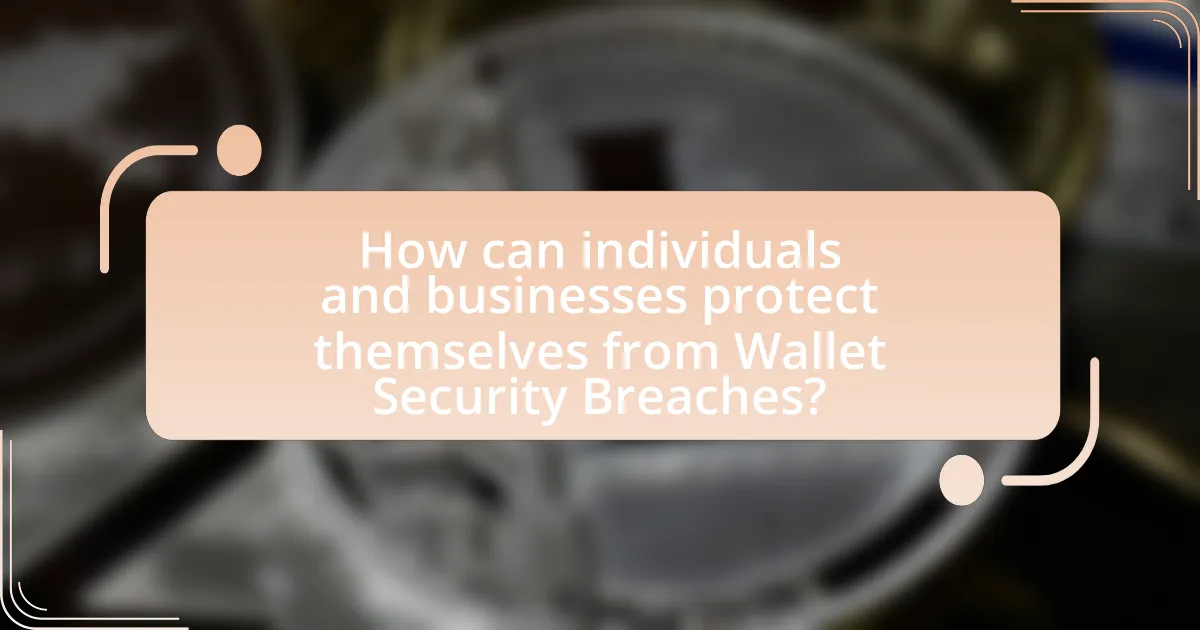Wallet security breaches refer to unauthorized access to digital wallets, compromising sensitive information such as private keys and personal data. These breaches can occur through phishing attacks, malware, and software vulnerabilities, leading to significant financial losses for individuals and businesses. The article explores the legal implications of such breaches, including liability for financial losses, regulatory penalties, and the responsibilities of wallet providers under data protection laws like the GDPR and CCPA. It also discusses the potential legal recourse available for victims and businesses affected by breaches, as well as best practices for enhancing wallet security.

What are Wallet Security Breaches?
Wallet security breaches occur when unauthorized individuals gain access to digital wallets, compromising sensitive information such as private keys, passwords, or personal data. These breaches can result from various factors, including phishing attacks, malware, or vulnerabilities in wallet software. According to a report by Chainalysis, over $3.2 billion was stolen from cryptocurrency wallets in 2021 alone, highlighting the significant risks associated with wallet security.
How do Wallet Security Breaches occur?
Wallet security breaches occur primarily through methods such as phishing attacks, malware infections, and exploitation of software vulnerabilities. Phishing attacks trick users into revealing sensitive information, while malware can capture credentials or manipulate wallet software. Additionally, vulnerabilities in wallet applications or underlying blockchain technology can be exploited by attackers to gain unauthorized access to funds. According to a report by Chainalysis, in 2021, over $7.7 billion was stolen from cryptocurrency wallets, highlighting the prevalence and impact of these breaches.
What common vulnerabilities lead to Wallet Security Breaches?
Common vulnerabilities that lead to wallet security breaches include weak passwords, phishing attacks, and outdated software. Weak passwords can be easily guessed or cracked, allowing unauthorized access to wallets. Phishing attacks trick users into revealing sensitive information, such as private keys or login credentials, often through deceptive emails or websites. Outdated software may contain unpatched security flaws that hackers can exploit, compromising wallet security. According to a report by the Cybersecurity and Infrastructure Security Agency, 90% of successful cyberattacks stem from human error, highlighting the critical role of user awareness in preventing breaches.
How do hackers exploit these vulnerabilities?
Hackers exploit vulnerabilities by leveraging weaknesses in software, hardware, or network systems to gain unauthorized access to sensitive information. They often use techniques such as phishing, malware deployment, and exploiting unpatched software to infiltrate systems. For instance, according to the Verizon Data Breach Investigations Report, 22% of breaches involved phishing, indicating that this method is a prevalent tactic for hackers to exploit vulnerabilities. Additionally, hackers may utilize automated tools to scan for known vulnerabilities, allowing them to quickly identify and exploit weaknesses in systems that have not been updated or secured properly.
What are the consequences of Wallet Security Breaches?
Wallet security breaches lead to significant financial losses for users, as unauthorized access can result in theft of funds. According to a report by the Federal Trade Commission, consumers lost over $1.9 billion to fraud in 2020, with a substantial portion attributed to digital wallet breaches. Additionally, these breaches can damage the reputation of wallet providers, leading to loss of customer trust and potential legal liabilities. Regulatory bodies may impose fines and sanctions on companies that fail to protect user data adequately, as seen in cases where firms faced penalties for non-compliance with data protection regulations. Thus, the consequences of wallet security breaches encompass financial loss, reputational damage, and legal repercussions.
How do Wallet Security Breaches affect individuals?
Wallet security breaches significantly affect individuals by exposing their personal and financial information, leading to potential identity theft and financial loss. When a breach occurs, unauthorized parties can access sensitive data such as credit card numbers, passwords, and bank account details, which can result in fraudulent transactions. According to a report by the Identity Theft Resource Center, in 2020, there were over 1,100 data breaches in the United States, affecting millions of individuals and resulting in billions of dollars in losses. This highlights the severe impact of such breaches on personal security and financial stability.
What impact do Wallet Security Breaches have on businesses?
Wallet security breaches significantly undermine businesses by eroding customer trust and leading to financial losses. When a breach occurs, customers often lose confidence in the security of their transactions, which can result in decreased sales and customer retention. According to a study by IBM, the average cost of a data breach in 2021 was $4.24 million, highlighting the financial repercussions businesses face. Additionally, companies may incur legal liabilities and regulatory fines, as they are often required to notify affected customers and comply with data protection laws. This combination of lost revenue, increased costs, and potential legal consequences illustrates the profound impact wallet security breaches have on businesses.

What are the Legal Implications of Wallet Security Breaches?
Wallet security breaches can lead to significant legal implications, including liability for financial losses, regulatory penalties, and potential lawsuits. When a breach occurs, the entity responsible for the wallet may be held accountable for failing to implement adequate security measures, violating data protection laws such as the General Data Protection Regulation (GDPR) or the California Consumer Privacy Act (CCPA). These regulations impose strict requirements on organizations to protect consumer data and can result in fines reaching millions of dollars for non-compliance. Additionally, affected users may pursue legal action for damages, which can further escalate the financial and reputational consequences for the breached entity.
What laws govern Wallet Security Breaches?
Laws governing wallet security breaches primarily include data protection regulations such as the General Data Protection Regulation (GDPR) in Europe and the California Consumer Privacy Act (CCPA) in the United States. These laws mandate that organizations implement adequate security measures to protect personal data and notify affected individuals in the event of a breach. For instance, GDPR requires organizations to report breaches within 72 hours and imposes fines for non-compliance, reinforcing the legal obligation to safeguard digital wallets.
How do data protection laws apply to Wallet Security Breaches?
Data protection laws mandate that organizations must implement adequate security measures to protect personal data, including data stored in digital wallets. In the event of a wallet security breach, these laws require organizations to notify affected individuals and relevant authorities promptly, typically within 72 hours, as stipulated by regulations such as the General Data Protection Regulation (GDPR) in the European Union. Failure to comply with these requirements can result in significant fines, which can reach up to 4% of annual global turnover or €20 million, whichever is higher. Additionally, organizations may face legal actions from affected users for damages resulting from the breach, reinforcing the necessity for robust security protocols to safeguard personal information.
What are the legal responsibilities of wallet providers?
Wallet providers are legally responsible for ensuring the security and protection of users’ funds and personal information. This includes implementing robust security measures to prevent unauthorized access, complying with data protection regulations such as the General Data Protection Regulation (GDPR) in Europe, and adhering to anti-money laundering (AML) and know your customer (KYC) requirements. Failure to meet these responsibilities can result in legal consequences, including fines and liability for losses incurred by users due to security breaches. For instance, in 2020, the U.S. Financial Crimes Enforcement Network (FinCEN) emphasized the importance of compliance with AML regulations for cryptocurrency wallet providers, highlighting the legal obligations they face in safeguarding user assets.
What are the potential legal consequences for victims?
Victims of wallet security breaches may face several potential legal consequences, including financial loss recovery, identity theft implications, and potential liability for unauthorized transactions. Victims can pursue legal action against the responsible parties to recover lost funds, as established by consumer protection laws that allow for restitution in cases of fraud. Additionally, victims may need to navigate the complexities of identity theft laws, which can lead to further legal challenges if their personal information is misused. Furthermore, if victims fail to report the breach promptly, they may inadvertently assume liability for unauthorized transactions, as many financial institutions have specific reporting timelines that affect liability.
How can victims seek compensation for losses?
Victims can seek compensation for losses resulting from wallet security breaches by filing a claim against the responsible party, such as the wallet provider or a third party involved in the breach. This process typically involves gathering evidence of the breach, documenting the losses incurred, and submitting a formal complaint or lawsuit to the appropriate legal authority. According to the Federal Trade Commission, consumers have the right to seek restitution for financial losses due to fraud, which reinforces the validity of pursuing compensation through legal channels.
What legal recourse is available for businesses affected by breaches?
Businesses affected by breaches can pursue several legal recourses, including filing lawsuits for damages, seeking injunctions to prevent further breaches, and reporting incidents to regulatory authorities. Lawsuits can be based on claims such as negligence, breach of contract, or violations of data protection laws, which may allow businesses to recover financial losses incurred due to the breach. Additionally, businesses may seek remedies under specific regulations like the General Data Protection Regulation (GDPR) or the California Consumer Privacy Act (CCPA), which impose penalties on entities that fail to protect consumer data. These legal frameworks provide a structured approach for businesses to address the consequences of breaches and seek compensation or corrective actions.

How can individuals and businesses protect themselves from Wallet Security Breaches?
Individuals and businesses can protect themselves from wallet security breaches by implementing strong security measures such as using two-factor authentication, regularly updating software, and employing secure passwords. Two-factor authentication adds an extra layer of security, making it harder for unauthorized users to access wallets. Regular software updates ensure that any vulnerabilities are patched, reducing the risk of exploitation. Additionally, using complex passwords that combine letters, numbers, and symbols can significantly enhance security. According to a report by Cybersecurity Ventures, cybercrime is projected to cost the world $10.5 trillion annually by 2025, highlighting the importance of robust security practices.
What best practices should be followed for wallet security?
To ensure wallet security, users should implement strong passwords, enable two-factor authentication (2FA), and regularly update software. Strong passwords, consisting of at least 12 characters with a mix of letters, numbers, and symbols, significantly reduce the risk of unauthorized access. Enabling 2FA adds an additional layer of security by requiring a second form of verification, such as a text message or authentication app, which can prevent unauthorized transactions even if a password is compromised. Regular software updates are crucial as they often include security patches that protect against newly discovered vulnerabilities. According to a study by the Cybersecurity & Infrastructure Security Agency, 80% of data breaches could be prevented with proper security measures, highlighting the importance of these best practices in safeguarding digital wallets.
How can users enhance their personal wallet security?
Users can enhance their personal wallet security by implementing strong, unique passwords and enabling two-factor authentication (2FA). Strong passwords should consist of at least 12 characters, including a mix of uppercase letters, lowercase letters, numbers, and special symbols, which significantly reduces the risk of unauthorized access. Enabling 2FA adds an additional layer of security by requiring a second form of verification, such as a text message or authentication app, making it more difficult for attackers to gain access even if they have the password. According to a study by Google, 2FA can block 100% of automated bots and 96% of phishing attacks, demonstrating its effectiveness in enhancing security.
What measures can businesses implement to safeguard wallets?
Businesses can implement multi-factor authentication (MFA) to safeguard wallets. MFA requires users to provide two or more verification factors to gain access, significantly reducing the risk of unauthorized access. According to a study by the Cybersecurity & Infrastructure Security Agency, MFA can block 99.9% of automated cyberattacks, demonstrating its effectiveness in enhancing wallet security. Additionally, businesses should regularly update their software and conduct security audits to identify vulnerabilities, as outdated systems are prime targets for breaches. Implementing encryption for wallet data further protects sensitive information, as encrypted data is unreadable without the proper decryption key. These measures collectively create a robust security framework that mitigates the risk of wallet breaches.
What resources are available for further guidance on wallet security?
Resources available for further guidance on wallet security include the Federal Trade Commission (FTC) website, which provides comprehensive information on protecting digital assets, and the Cybersecurity & Infrastructure Security Agency (CISA), which offers guidelines on securing cryptocurrency wallets. Additionally, the Blockchain Association publishes best practices for wallet security, and organizations like the Electronic Frontier Foundation (EFF) provide resources on privacy and security in digital transactions. These resources are credible and widely recognized in the field of cybersecurity, ensuring that users can access reliable information to enhance their wallet security.
Where can individuals find legal assistance regarding Wallet Security Breaches?
Individuals can find legal assistance regarding wallet security breaches through specialized law firms that focus on cybersecurity and digital asset protection. These firms often provide consultations and legal representation for victims of security breaches, helping them navigate the complexities of digital asset laws and potential recovery options. Additionally, organizations such as the Electronic Frontier Foundation and local consumer protection agencies offer resources and referrals to legal professionals experienced in handling cases related to digital wallet security.
What organizations provide support for wallet security education?
Organizations that provide support for wallet security education include the Cybersecurity and Infrastructure Security Agency (CISA), which offers resources and training on securing digital wallets. Additionally, the National Cyber Security Centre (NCSC) provides guidance on best practices for wallet security. The Electronic Frontier Foundation (EFF) also educates users on privacy and security measures related to digital wallets. These organizations are recognized for their contributions to enhancing public awareness and understanding of wallet security issues.